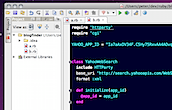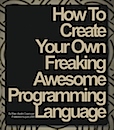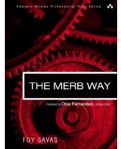By Peter Cooper / September 25, 2009
 A couple of weeks ago, popular micro-blogging service Twitter unveiled a beta “streaming API.” Twitter’s nature means they get hammered with polling requests so they’ve begun to experiment with the concept of streaming relevant data within a single HTTP request (in a Comet style). TweetStream (or GitHub repo) is a new Ruby library by Michael Bleigh to handle interacting with Twitter streams from Ruby.
A couple of weeks ago, popular micro-blogging service Twitter unveiled a beta “streaming API.” Twitter’s nature means they get hammered with polling requests so they’ve begun to experiment with the concept of streaming relevant data within a single HTTP request (in a Comet style). TweetStream (or GitHub repo) is a new Ruby library by Michael Bleigh to handle interacting with Twitter streams from Ruby.
TweetStream is available as a gem from both GitHub and Gemcutter (which, incidentally, got a fresh design today) and installation instructions are given in Michael’s blog post about TweetStream. Once you’re all installed, though, reading the live stream becomes as simple as:
require ‘tweetstream’
TweetStream::Client.new(TWITTER_USERNAME, TWITTER_PASSWORD).sample do |status|
puts “[#{status.user.screen_name}] #{status.text}”
end
Beyond basic functions, though, TweetStream also include daemonization features that allow you to create scripts that run in the background “out of the box.” You could add these features yourself with the daemons library, sure, but having this at hand to quickly throw together Twitter scripts is pretty cool. Read More
 RubyPulse is a screencast site that publishes regular videos about different Ruby libraries. It’s a month old so far and German Ruby developer Alex Peuchert has put out 9 episodes already. With a little support, perhaps Alex will be able to keep it going and become the pure Ruby equivalent of Ryan Bates!
RubyPulse is a screencast site that publishes regular videos about different Ruby libraries. It’s a month old so far and German Ruby developer Alex Peuchert has put out 9 episodes already. With a little support, perhaps Alex will be able to keep it going and become the pure Ruby equivalent of Ryan Bates!







 Today Phusion has
Today Phusion has  A couple of weeks ago, popular micro-blogging service
A couple of weeks ago, popular micro-blogging service 
 French Rubyist
French Rubyist 

 Welcome to the latest in the series of random Ruby related links I’ve picked up over the past few weeks. It’s a crazy grab-bag of links this time around! Whatever your job, interest, or fetish, there’s bound to be something in here that tickles your fancy if you’re a Rubyist. Enjoy!
Welcome to the latest in the series of random Ruby related links I’ve picked up over the past few weeks. It’s a crazy grab-bag of links this time around! Whatever your job, interest, or fetish, there’s bound to be something in here that tickles your fancy if you’re a Rubyist. Enjoy! I’ve been reading the
I’ve been reading the 

 I have been contemplating the use of document-stores in my Ruby apps for a few months (you might remember my
I have been contemplating the use of document-stores in my Ruby apps for a few months (you might remember my 